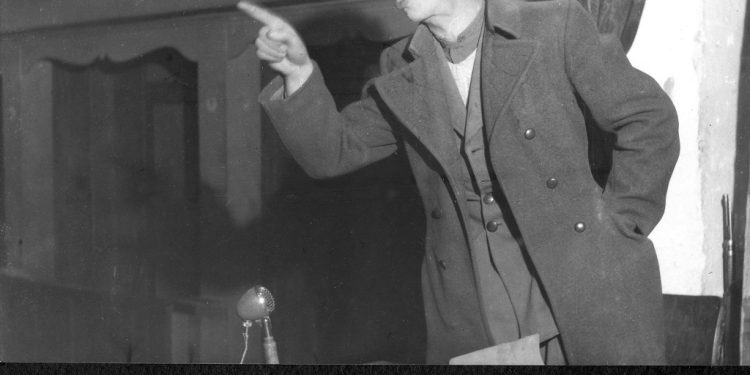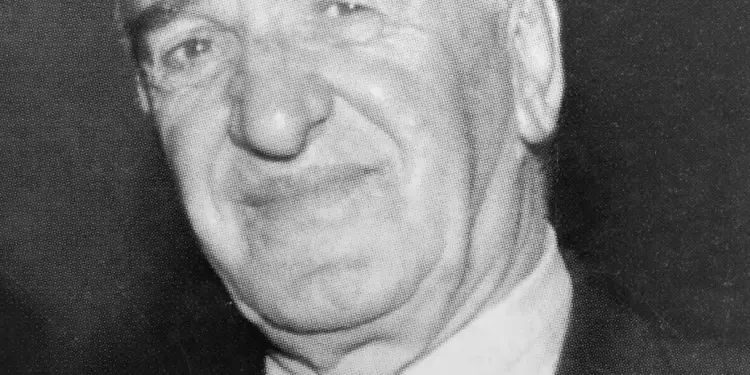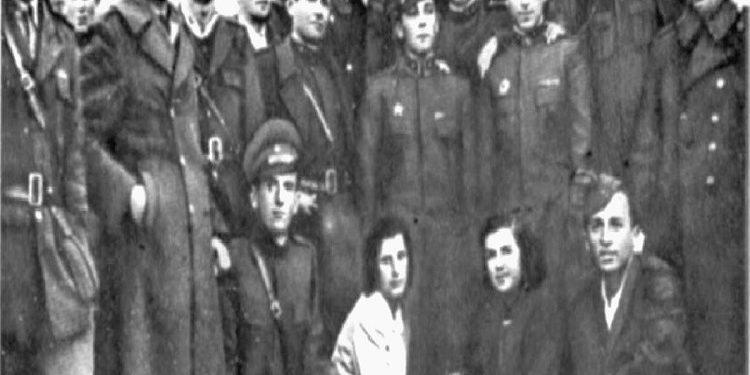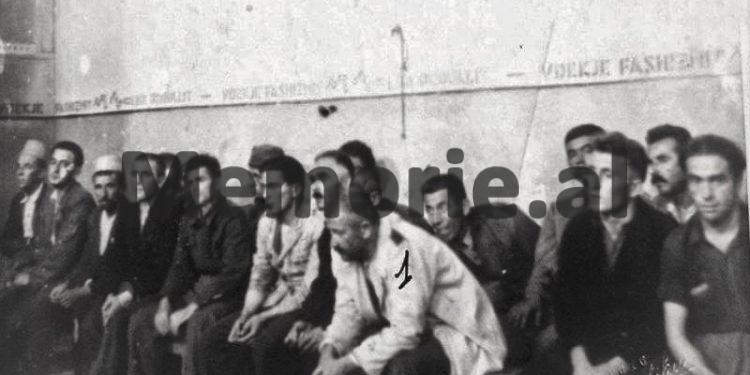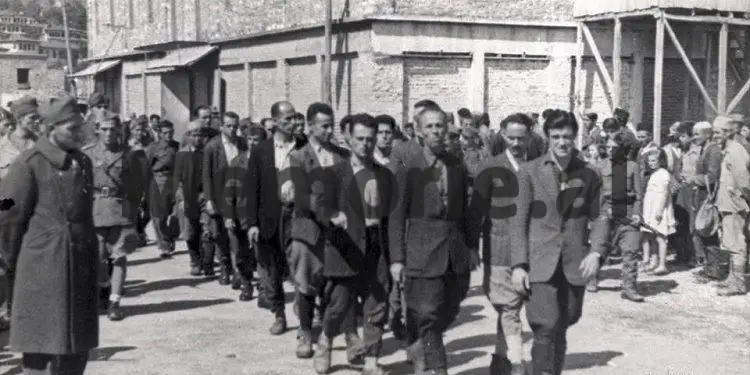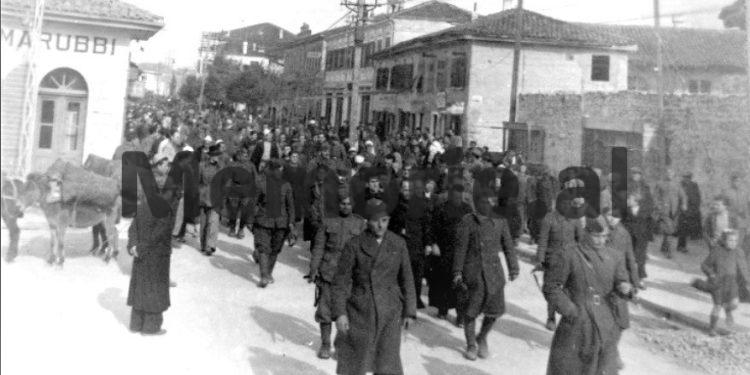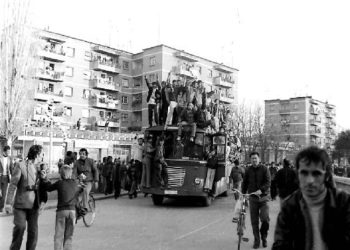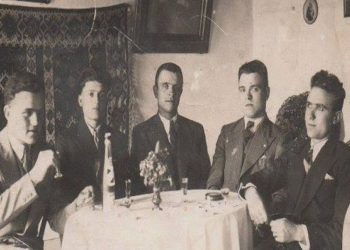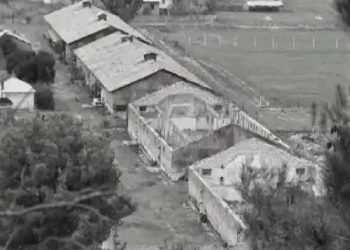By Ahmet Bushati
Part Six
Memorie.al/After the flag was altered in 1944 with the addition of the communist star, Shkodra transformed into a center of resistance against the regime, paying a high price for its tradition of freedom. By April 1945, high school students, already feeling betrayed by the promises of the war, gathered to oppose the new terror that imprisoned and killed innocent people. Communism turned Kosovo into a province of Yugoslavia, while Shkodra was punished for its “historical crime”- its defiance against invaders. The “Postriba Movement” became a tool to suppress all dissent, plunging the city into an unprecedented spiral of suffering: imprisonments, executions, and the destruction of families. The high school students, alongside citizens, became symbols of resistance, while some “young communists” turned into tools of the State Security, leading to expulsions, imprisonments, and internments.
Four times, Shkodra rose in armed rebellion, but history forgot these battles. This book is written to remember the countless prisoners, the tortured, the killed, and the parents who suffered in silence. It is a warning against dictatorship and a plea for future generations not to forget the sacrifices made for freedom.
Continued from the previous issue
In the Footsteps of a Diary
Shkodra in the first years under communism
Shkodra through the chronicles
Parallel to the euphoria of the communists and their families, excited by the victory, rallies would be held in Shkodra from time to time, occasions when in their stands you would generally see the faces of mediocre and ignorant militants, with only five primary school grades, as well as enthusiastic officers of the partisan corps, who from time to time would speak with great pathos about the war they had fought.
Most of all, the young hierarchs of the city would speak from those stands, such as Zija Dibra, Arif Gjyli, Gjovalin Luka, Mark Ndoja, etc. In their short but passionate speeches, the heroic struggle of the partisans would be constantly glorified, as well as their fraternal bond with Marshal Tito’s Yugoslavia.
Also, in their standard speeches, an important place would be occupied by boundless hatred for their political opponents, who would be called “traitors” and “sold to foreigners”, without ever failing to remind them of their tragic and inevitable end, while the citizens of Shkodra, even in those speeches, were watching with shock the emergence of the profile of an Albania already filled with countless dangers.
As early as the first days of December 1944, the newspaper published in Tirana, ” News Bulletin “, would arrive in Shkodra, consisting of four pages and in a small format, which would briefly reflect events from the country, combat actions of the Albanian and Yugoslav brigades in the unliberated lands of “sister Yugoslavia”, as well as the successes of the “Red Army” on its “Eastern Front”.
The Anglo-Americans still continued to be called “allies” with hypocritical politeness and their combat actions on the “Western Front”, although very successful, would be reflected in a rather telegraphic manner. Within a few days, Shkodra would also publish its own newspaper entitled ” Echo of Shkodra “, which after a month would change to “Koha e Re”, which, if it did not deviate from the events of Shkodra in circles, would be a copy of that of Tirana for the rest.
From the first days after the partisans entered Shkodra, many of their political opponents would be arrested: Ballists, who were generally young in age – and such as intellectuals – as well as Zogists, many of whom had also suffered Italian persecution. Initially, these prisoners would be gathered in the large store of “Ulqinaku” and some others in the lobby of the first floor of the prefecture, to be packed together like sardines in the latter after a few days, where the former legalist captain, Daut Kombi, as well as the Spanish doctor, would die.
Within a few more days, the country’s authorities would release several young people from prison, to fill the ranks on the Yugoslav front. Such an act would be called “the generosity” of their popular power and “honor” by the local authorities, for those who benefited from it, regardless of the fact that not long after their return to Shkodra, many of them, such as Kolë Kurti, Hilmi Kamata, Zef Gera, Luigi Toni, Syrri Golemi, etc., would be re-imprisoned…!
On December 15, 1944, the daily press, as well as the announcements posted in various places around the city, would announce the important events that the “Antifascist National Liberation Council” had taken in Tirana, bearing the signatures of Dr. Omer Nishani, as chairman of that Council, and Koço Tashko, as its secretary. They were decisions with a strong revolutionary character, which would instill much concern and fear in the people, as if by force.
The first article of that decision spoke of the confiscation of the movable and immovable property of the fugitives, causing the families of Sali Muftië, Gjon Marka Gjoni, Sheuqet Mukës, Xhelal Bushati, Xhemal Naipi, Ismail Elezit, Ndoc Jakova, Sabri Daca, Llesh Marashi, Mark Males, as well as the families of Dedaj, Negri and a Dibran officer, with the surname Dema, Haxhi Kastrati of Bërdica, etc., to be removed from their homes as soon as the day after its publication, to be interned somewhere in the vicinity of Berat.
It would not be long before a day would come when even wealthy citizens would be forced to abandon their large and comfortable homes, to leave them to the new Tosk and local rulers, and themselves would be forced by the “Neighborhood Councils” to live among the abandoned stoves of various citizens and sometimes uninhabitable ones. There would be cases when such a ruler would not like the house that had been assigned to him, or the loot that he had found in it, and his claims, as a rule, would be immediately satisfied.
It was a matter of crying and laughing, when it was generally known from what places and from what life these young gentlemen came, under whose feet Shkodra and all of Albania were destined to fall. I once had the opportunity to see how partisans who had probably never even owned a house, out of hatred for the unknown owner of a “reactionary” house, specifically that of Sylço Bey, would throw various pieces of furniture that were in very good condition out of the large windows, and when they would shatter to the ground with a hammer, those partisans, out of pleasure at their vandalic deed, would fight among themselves like animals.
One of the legal articles that would create countless victims would be the one that literally stated: “All those who harbor fugitives, or who have knowledge of them and do not tell, are punished with years of imprisonment, even death.” And how could our Malcor, for example, understand such a law, which would be in complete contradiction with his worldview, with his most supreme institutions, such as that of trust and hospitality, for which he had that cult that we also know?! Wouldn’t they be worth more than bread, even if he had lacked it, and even than life itself?! Or hadn’t he expressed in his lifetime that; “the enemy belongs to the friend!” All of the above was only the prelude that he was telling the people at the time, for the tragedy that had just begun.
It was the time when Mehmet Shehu would come to Shkodra with his notorious corps. During those cold and snowy days, people, especially mountaineers, accused of having sheltered fugitives, were constantly being shot; they were shot if they had been given a piece of bread in their hand; they were shot for an old rifle that they had found hidden; and perhaps more often they were shot for no reason, except for terror! The names of those shot that day, printed in black letters on a background of green paper, were probably displayed in several different points of the city, but I would regularly see them on the facade of a bakery, which is still located today opposite the “Luigj Gurakuqi” university, on the hospital road.
There the citizens would gather to read the names of those unfortunates, and I would have the opportunity to observe how they, as they were about to leave, would look at each other with an expression of deep sorrow, and how the strangers who were usually shot among them would disperse without speaking and with their eyes on the ground. As we said above, many of those mountaineers who had never had enough bread, who had never had a day of school, and who, nevertheless, would be called and killed as reactionaries.
It is told of a case when the Dukagjinas were tied hand to hand with wire in front of the firing squad, and while they were expecting their bodies to be pierced by the bullets of the partisan machine guns facing them, at precisely such a moment, the commander of that squad, to satisfy his sadism, would find the opportunity to quietly crack walnuts over the heads of those unfortunates, and then chew them with apparent carelessness, as if to show the others there that the death of those who were being shot did not deserve anything, not even the spoiling of the enjoyment of eating walnuts.
It relates to the implementation of the decisions of the “National Liberation Council”, in Shkodra, which imposed a curfew. On that occasion, a house-to-house search was conducted, searching for suspicious people, weapons, and any other items provided for in that decision.
The day the curfew was imposed was fine and sunny, but also cold and with freezing snow, since a few days earlier. The streets were deserted, because it was forbidden for people to go outside that day. Rarely would one see any of those well-known activists who, as if to satisfy their childish vanity, would rush through the streets, seeking to appear important in the eyes of anyone who might notice them from a gate or window overlooking the street, more than out of their good will, to lead the control groups made up of non-local partisans.
Meanwhile, inside the houses, people that day were anxiously awaiting their turn to be checked, since everyone had something they wanted to show the partisans. However, many old Shkodra houses, on that occasion, in addition to the rifles of the time that they themselves surrendered, would also lose objects of unparalleled museum value, inherited from generation to generation and carefully and proudly preserved on the walls of the best rooms they had. Under the pretext of collecting weapons, old rifles of various types were seized and appropriated that day. A pair of binoculars that was removed from the wall that day, where it had been hanging for many years, would remain in my heart as a testament to a friendship that was highly valued in our house: they were binoculars given to my father, when he was a child, by Hasan Riza Pasha himself, for the friendship he had with his grandfather.
To my protests, the officer replied, turning to my father: “According to the instructions we have, we are obliged to seize them once, and then perhaps we can return them to you. If you do not stray from the time we are talking about, we point out that Yugoslav soldiers, with a serious attitude and as if they were true superiors, would daily overtake you in the streets of our city.
You should know that with them we shared not only culture, traditions and everything that separates one people from another, but also a history of our own written in the blood of our ancestors, so that their presence in Shkodra as “comrades” and “brothers” was seen by the people as a masterpiece of irony. It was too soon for Shkodra to forget how those Montenegrins, only thirty years ago, had just wanted to attack the Shkodra of their dreams eternal, they would greet each other with the words: “Dovigenja u Scadar i nashe more”! (Goodbye to Shkodra and our sea).
Shqinia was daily turning more and more into a vassal province of Yugoslavia. The press, with its unbridled declarations, in token of boundless gratitude to Marshal Tito’s Yugoslavia, “without which we would not have achieved freedom”, would sound like a disgusting refrain that was repeated with fury for days, harassing and killing the pride of our citizens.
Shkodra, due to the abundance of material goods it had inherited from the war, would also become their first victim economically. In Shkodra, car after car would be loaded every day with various goods and set off for Yugoslavia, supposedly accompanied by a document that was nothing more than a simple piece of paper, at the top of which was written the name of the shop or warehouse of the former merchant where it was loaded with his seized goods, in the middle of it, the order expressed with the word; “to be loaded” and below, on the right side, usually the signature of Zija Dibra, and in his absence, of any other official, even an engineer, such as that of Anthim Konomi, who at that time covered the “public works” sector, for Shkodra.
We explain that the end of the War had found Shkodra with an abundance that had never been seen before. Even if there had been a war, trade in Shkodra, as everywhere in Albania, had flourished greatly. For example, according to the Shkodra customs book, there in the Old Bazaar, just across the Buna River, during the War, eleven million “Millegiorni” brand tents had been cleared, from where they had taken various routes, such as that of Turkey, which was excluded from the war.
At the end of the War, there would have been many Shkodra merchants who would not have known where to put their goods. The shops and warehouses, including their large houses, would sometimes not be enough to house their numerous goods, and they would be forced to open up to their friends and relatives for that purpose.
Important employees at the central department for the Economy in Tirana would be surprised and would express great regret when they heard that Shkodra, without instruction or order, but on the initiative of its servile pride, had been completely emptied at the expense of the Yugoslavs.
Shkodra had the bad luck to pay for the mentality and style of its rather mediocre communists, already with a pronounced lack of personality, not to mention their patriotism that had been reduced to zero so quickly. For a case like this, one comes to mind an English proverb that says: “An insufficient lesson (Read: education), is a dangerous thing”, as well as a foreign scholar who, more or less as above, speaking about the French Revolution and by analogy with it, about revolutions in general, would explain that the first and most natural contingent of them, besides the homeless and the unemployed, would also be the discontented of the time!
For example, students who, due to their disability, could not continue their education; teachers who, for the same reason, could not become professors; the lawyer, who had not managed to make a career, and so on, that without denying the good intentions they may have had, especially in their initial efforts, one cannot ignore their internal drive from an inferiority complex, that they may have felt and suffered towards another class with true intellectual values, classified by them, bourgeois.
So this is their psychology, that for their low social position, they would blame and fight any order, as the alleged cause of injustice towards them. So our communists, emerging as cadres from the wars, with what culture and training would they resist an ideology that would be given to them without hindrance and day after day by the Party, like a child’s mother’s milk? And also, with the little training they had, with what would they resist the temptation to favors that their golden time was approaching?
Regarding the plundering of Shkodra by the Yugoslavs, as an illustration, we continue to show that various students or visitors, who in those early years returned from Belgrade, Split, Podgorica, or even from Moscow, thousands of kilometers away, would tell how in the shops of the aforementioned cities, they had noticed that goods from Shkodra merchants were being sold, such as “setapura socks”, umbrellas and hats with the label “Ulqinaku”, etc.
A person had said that in the museum of a Yugoslav leader in Belgrade, he had noticed the pair of three-necked sunglasses that the German firm “Krüp” had once given to Maliq Bushat as a sign of respect. Another Shkodra citizen would tell that in the house of a Montenegrin in Podgorica, he had recognized – among the twenty-eight that Shkodra had at that time – the pianoforte of Çita, the daughter of the pharmacist, Luigji Simoni, etc., etc.! Memorie.al




